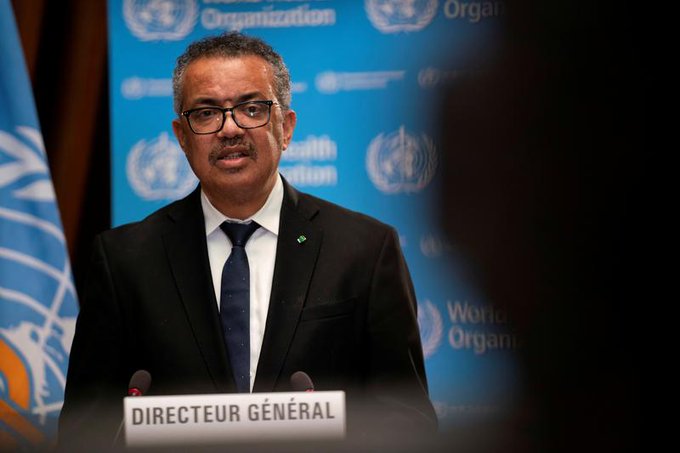The COVID-19 pandemic is “a long way from over” but there are many reasons to be optimistic and it’s possible the pandemic can be brought under control “within months”, the head of the UN health agency said on Monday.
Although January and February saw six consecutive weeks of plummeting COVID-19 cases, the World Health Organisation (WHO) chief said that had gone into reverse, with last week yielding “the fourth-highest number of cases in a single week so far”.
“We have now seen seven consecutive weeks of increasing cases, and four weeks of increasing deaths”, Tedros Adhanom Ghebreyesus told journalists at a regular media briefing.
More than 780 million doses of vaccine have now been administered globally, but several Asian and Middle Eastern countries have seen large increases in infections, he said.
While acknowledging that vaccines are “vital and powerful” instruments, the WHO chief reiterated that they are not the only tools needed to defeat the coronavirus.
“Physical distancing works. Masks work. Hand hygiene works. Ventilation works. Surveillance, testing, contact tracing, isolation, supportive quarantine and compassionate care – they all work to stop infections and save lives”, Tedros underscored.
While stressing the need for “a consistent, coordinated and comprehensive approach” in battling the virus, he said that “confusion, complacency and inconsistency in public health measures and their application, are driving transmission and costing lives”.
WHO wants to see societies and economies reopening, and travel and trade resuming, instead it is witnessing intensive care units overflowing and people dying, which Tedros maintained “is totally avoidable”.
He said proven public health measures and strong systems that have enabled countries to respond rapidly and consistently, illustrate that COVID “can be stopped and contained”, adding that those nations are now able to enjoy sporting events, concerts, restaurants and seeing their family and friends safely.
Currently, global manufacturing is insufficient to deliver quick, equitable vaccines and other essential health products, according to the WHO official.
Early in the pandemic, African countries agreed on a coordinated continental approach, “and now they’re coming together for a coordinated approach to scaling up manufacturing”, he said.
Tedros stressed the importance of investing in “sustainable and secure domestic manufacturing capacity and national regulatory authorities”, asserted that “what can be done today, should be done today”.
Noting that WHO and its partners have established a COVAX manufacturing taskforce, to increase supply and build a sustainable vaccine manufacturing platform, he offered the UN agency’s technical assistance in assessing the feasibility of local production and to access technology and know-how.
Despite continuing transmissions, some countries are re-opening restaurants, night clubs and indoor markets, with too few people taking precautions.
Moreover, the UN health chief observed that some young people appear to feel that it doesn’t matter if they get COVID-19.
“Young, healthy people have died. And we still don’t fully understand the long-term consequences of infection for those who survive”, he reminded, echoing reports of some mild cases that have left long-term symptoms, including fatigue, weakness and anxiety.
While the pandemic is “a long way from over”, Tedros said there were numerous reasons to be optimistic.
He pointed to the decline in cases and deaths during the first two months of the year as evidence that the virus and its variants can be stopped.
“With a concerted effort to apply public health measures alongside equitable vaccination, we could bring this pandemic under control in a matter of months”, he attested.
However, the WHO chief added that this hinges on the decisions and actions that governments and individuals make every day, spelling out: “The choice is ours”…..
SOURCE: WHO/PACNEWS














